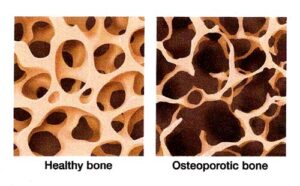You’ve probably heard about vital minerals we need for our bodies for optimal function. These minerals include potassium, chloride, sodium, sulfur, zinc, iron, magnesium, fluoride, selenium, copper, and calcium. Calcium is a mineral that plays a crucial role in bone health, nerve transmission, muscle contractions, and blood clotting. And even though it’s so important, many people overlook its significance in maintaining adequate calcium levels in their bodies.
According to Victoria Kang, a family medicine physician, “Calcium is a token to get different body organ systems to work, and it forms and maintains healthy bones since most calcium is stored in your bones. Calcium also helps your heart muscles pump and transmits signals to your nerves so your muscles contract.” Furthermore, Kang says if you’re “pregnant or breastfeeding, you should increase your daily intake to 1,200 mg to 1,300 mg. For context, milk contains 305 mg of calcium per cup, Parmesan cheese has 331 mg of calcium per ounce and 8 ounces of plain, full-fat yogurt has 274 mg of calcium.”

Brittle Bones
A surefire sign of calcium deficiency is brittle and weakened bones. This leads to conditions such as osteoporosis and osteopenia. If you have a calcium deficiency, you might experience an increased risk of fractures, even from simple falls or minor accidents. Going to the doctor for an X-ray might reveal reduced bone density and signs of bone thinning, indicating inadequate calcium levels in the body.
According to Sprint Diagnostics, “Our bones undergo continuous remodeling, with calcium entering and exiting daily. During childhood and adolescence, the body replaces lost bone more rapidly than it degrades, leading to an increase in bone mass. However, this process evens out around the age of 30. In later years, especially for post-menopausal women, bone breakdown outpaces new bone formation, potentially resulting in osteoporosis.” If you’re experiencing these fractures, you might be calcium deficient (Sprint Diagnostics).
